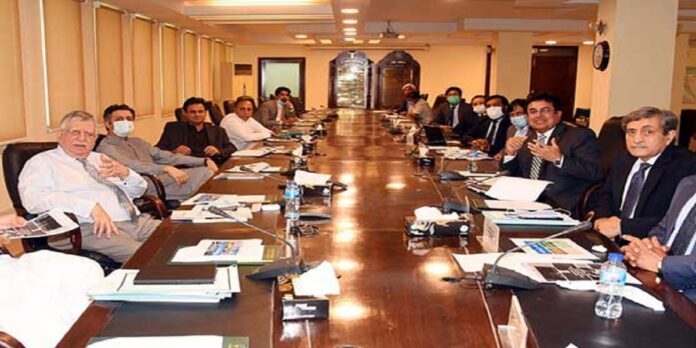ISLAMABAD: The Economic Coordination Committee (ECC) of the cabinet has approved the tender for importing 120,000 metric tonnes (MT) of wheat for maintaining strategic reserves and price stability in the domestic market.
A meeting of ECC was held under the chair of the Finance Minister Shaukat Tarin on Thursday in this regard.
On the recommendations of the Ministry of National Food Security and Research, the ECC approved the tender for procurement of wheat in compliance with the Cabinet’s directive of to procure 4 million metric tonnes of wheat to build reserves during the current financial year (FY22).
The ECC asked the Trading Corporation of Pakistan (TCP) chairman to expedite efforts for importing and to present a detailed report to the Adviser on Commerce Abdul Razak Dawood regarding the timeline of import and other requisite details at the earliest.
The ECC also approved a summary moved by the Federal Board of Revenue (FBR) chairman to strengthen the Inland Revenue Enforcement Network (IREN) to combat tax evasion and leakages of duties payable on specified goods through enforcement of the Track & Trace system.
The meeting was informed that the IREN will also check the goods supplied out of erstwhile FATA/PATA areas for ascertaining validity and conformity.
The finance minister stressed that the FBR must avoid harassment in collection of taxes and duties but take firm action to prevent tax evasion.
“A proper system of check and balance will be followed,” he said, urging FBR to use the latest technology based solutions for tax collection to reduce reliance on traditional enforcement methodology.
Further, the Ministry of Maritime Affairs moved another summary regarding relaxation to 19 subsidiary companies of PNSC under Public Sector Companies (Corporate Governance) rules.
The ECC approved relaxation in rules till June, 2022 with a direction to explore the option of formulating independent boards for the subsidiaries to be headed by CEO as per the principles of corporate governance.
The ECC was told that the Cabinet Committee on Ports & Shipping had decided that a separate company be established for each of PNSC ships. This being a policy decision of the federal government, 19 private limited subsidiary companies were formed.
PNSC being a holding company is responsible to manage all the commercial, technical administrative and financial matters of these companies via a service agreement signed between PNSC and the subsidiary companies. This decision was part of the overall reforms which were undertaken by the federal government for the profitable revival of PNSC and merchant shipping in Pakistan and was in line with the international shipping practices.
The primary purpose to create separate subsidiaries for each ship was to limit the liability of each vessel, especially in case of arrest of a vessel by any port, such as in case of a marine pollution incident or any other claims lodged by third-parties as such liabilities may sometimes exceed the value of the vessel, leading to disruption in commercial operations of other vessels owned by the same company due to act of a single vessel.
Since the 19 subsidiaries were formed with the objective to limit liability of PNSC for each ship rather than to form independent companies with diverse operations, PNSC applied to SECP for exemption for each of its 19 subsidiary companies.
The request of considered by SECP and granted two times exemption for a period of three years each from 2014 to 2016 and 2017 to 2019.
After the expiry of the latest exemption on June 30, 2019, PNSC again applied to SECP for further relaxation. However, in view of the changes made in PSCCG 2013 via SRO dated July, 2019, the federal government is now the competent forum to grant relaxation.
Therefore, SECP forwarded the request of PNSC to the Finance Division for approval of the federal government.
The Finance Division directed SECP that Pakistan National Shipping Corporation may approach the federal government for requesting relaxation from public sector companies.
The ECC was further informed that since there is a single mission of PNSC, and the subsidiaries were also formed under the umbrella of these objectives, if significant issues are placed before 19 different independent boards of subsidiaries for decision making then there would be no common vision and there would be a lack of unity of command.
The Maritime Affairs Minister stated that the primary purpose behind forming subsidiaries is to limit liability through individually incorporated entities by managing one vessel each owned by the subsidiaries. In case the required relaxation from PSCCG for subsidiaries is not granted, PNSC would have no option but to revert back to the structure of a single company for all vessels, which would expose the entire PNSC fleet to commercial and operational risks.
The ECC also approved a summary presented by the Ministry of National Health Services regarding exemption from taxes and duties on import of auto disable syringes and raw materials for local manufacturing of auto disable syringes enabling transformation from conventional to auto disable syringes.
Moreover, the ECC constituted a sub-committee comprising representatives of M/o Petroleum, OGRA, PSO, A.F Ferguson, and Maritime Affairs and Finance Division to be headed by deputy chairman Planning to decide about tariff differential accumulated between 2012 to 2020.
























